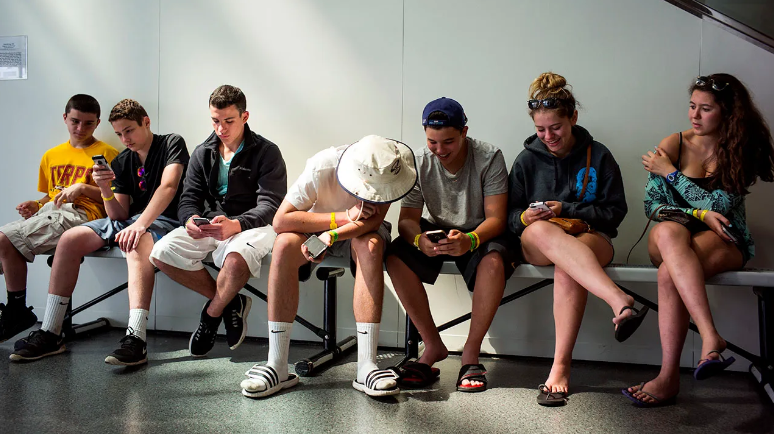According to Pew Research Center, 95% of teens have access to a smartphone. These days, a majority of our communication is done digitally, and it’s common to see teens walking everywhere in public with at least an earbud in. This has changed rapidly since 2000, and it’s not a good thing.
For girls, the rise of social media has rapidly increased the prevalence of eating disorders, depression, and suicide. For boys, the same applies, along with increasing far-right radicalization and a male loneliness epidemic. Attention spans are shrinking, anti-social behavior is growing, and this train shows no signs of stopping. The impact of algorithmic social media has been a double edged sword for our generation, raised on and around the internet.
For teachers and parents, they see it every day, a constant annoyance as fingers creep closer to pockets. The urge to open our phones and start scrolling seems to be a recurrent issue and continues to be a tug-of-war between students, parents, teachers, and administrators in finding the line. But is any of this necessary? Do we need our phones at all?
Our parents survived just fine without phones, both in and out of school. Even with the advent of the internet and mostly-digital material, we still have our school laptops to see these things. As a student myself, I believe that we don’t truly need our phones in school, between the bells. We all need to disconnect and face the world and each other without the filter of screens.
Not everything needs to be out there. I see videos everyday of people posting extremely personal stories and thoughts, all for the internet to devour and store, forever. Some things need to stay between people, or just dealt with on your own. With our growing, permanent digital records, colleges and companies see everything we put out there, and it certainly will affect our chances to succeed in the future. Just because we have the option to connect with the world on anything we think of doesn’t mean we should exercise that option.
Social media, while tying us all together, also divides us stealthily. Algorithms give us only what we want to see, and this creates echo chambers of similar opinions that contribute to greater political and social divides, as well as distributing harmful engagement-farming content. For men, this has created a right-leaning movement of “grind” culture, which has led to increased misogyny and toxic masculinity online. For women, this has created unhealthy beauty norms and a toxic image culture, especially on TikTok and Instagram.
One of the greatest debates for Gen Z in this era has been social media- is it a benefit, or a detriment? I think it has been a detriment, one that we need to put proper limits and social norms around to use responsibly. Our government needs to step up to face social media companies, and put common-sense public health regulations around algorithmic content and screen time, as it has been laughably lacking. For example, Section 230, which governs social media companies’ liability for their users, hasn’t been updated substantially for 26 years. Secondly, we need to develop better social norms to encourage teens and the greater public to get offline and see reality, as often what we see through our screens is just a facade of what is real.
As a society, we need to learn to be bored without constant engagement, let ourselves disconnect, and get out there and touch grass.



















